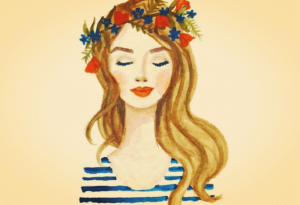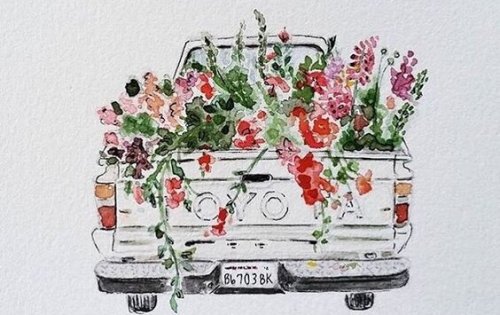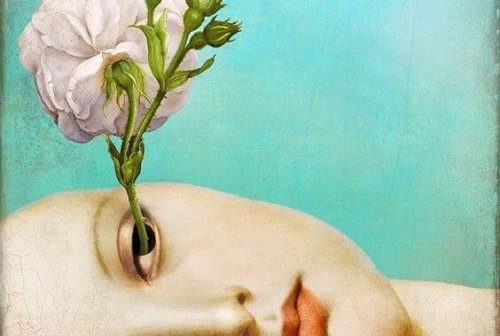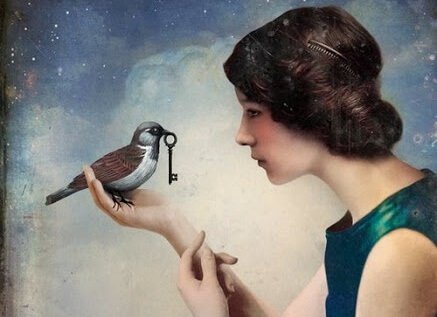A Person's True Essence is Worth More than External Beauty


Written and verified by the psychologist Valeria Sabater
I like people who don’t judge a book by its cover. I like people who are curious, passionate, enthusiastic, and patient enough to savor each page of a novel. People who take the time to discover its essence and magic.
The most beautiful treasures are found if you look past faces and clothing styles. Sometimes the most amazing person is hiding behind a shy facade.
Of course, it’s easy to say this kind of thing. It’s a perfect slogan, you can picture it on the cover of a self-help book. But we all know that many people’s minds seem to come pre-made with prejudices and stereotypes.
The classic belief that beautiful means good, attractive means noble, and youth is worth preserving at all costs. These ideas mean we are stuck living in a hypocritical society.
“The inner life needs a comfortable house and a good kitchen.”
-David Herbert Lawrence-
It’s not easy to see a person’s essence just by looking. And it doesn’t just take time. Really, you need to dismantle the biases society instilled in you and told you were right.
Above all, you need the will to see. You need a desire to dig a little deeper, move beyond physical appearance and “truths” that don’t allow for exceptions.
Because we often find ourselves in situations where everyone is trying hard to be something they aren’t. They fake virtues they don’t have, and hide their true beauty under layers of makeup and disorders like bulimia.
This type of behavior is unhealthy and miserable. Instead, you have to look for the essence in yourself and in others. You need to find the perfect balance between who you are and what you feel, and what you show to the external world.

Why does my brain want to jump to conclusions about people?
We are too busy, hyper-stimulated and distracted to notice details. Well, this is precisely the heart of the problem. That’s why 90% of us judge a person based on looks alone: we make a quick assessment so we know how to react.
The brain is a born economizer. We know that the computer metaphor is trite, but like it or not this “almost” perfect organ works just like one. It processes data, comes to a conclusion, and generates an answer.
So, when we come into contact with someone different, our brain labels them as “untrustworthy.” Whether they’re a foreigner, from another culture, have a different skin color, etc. For many people, “different” still means “dangerous,” so the brain discretely sends signals for us to distance ourselves.
However, the brain has a history to draw upon in order to reach these types of conclusions. Our education, previous experiences, and personality are some factors that shape the brain’s filter.
These factors are primarily responsible for how we react to difference. They influence whether we give in to our biases or set our stereotypes aside and show openness and interest to the person in front of us.

How do we see a person’s true essence, then? We can get there by widening our perception, expanding our filters. Try to take power away from the stereotypes that society instills in you. Only close-minded and inflexible people with tunnel vision use these arbitrary labels without thinking.
Respecting your own essence
Up to now, we’ve talked about the importance of looking beyond what our senses tell us. That way we can go deeper into things underneath physical appearance.
However, few of us will be able to take that journey if we don’t explore our own essence first. That way we can show the world who we really are. We can present our true selves, without distortions or falsehoods.
“We are happy when for everything inside us there is a corresponding something outside us.”
-William Butler Yeats-
It isn’t easy to do. Your false self is really a defense mechanism. You use it to hide your insecurity, fear, and maybe even trauma. And we can’t forget about the influence of gender roles pushing us to stick to certain paths.
Women are supposed to be beautiful and forever young. Men, on the other hand, are supposed to be strong and self-assured. It’s hard, then, to be yourself, in a world that tells you from the get-go how you “should be.”

It was Carl Gustav Jung who said that nothing is more difficult to achieve than individuation. That is, the space where we are able to connect with and live according to our own essence.
According to the Swiss psychiatrist, this journey towards uniqueness will take some battles. We have to fight against biases and stereotypes that our complex (and sometimes selfish) community has built up throughout history.
Only then will be able to appreciate our inner essence and live in harmony with it. At the same time, we will be able to respect the essence of others. The journey, and the result, are more than worth it.
I like people who don’t judge a book by its cover. I like people who are curious, passionate, enthusiastic, and patient enough to savor each page of a novel. People who take the time to discover its essence and magic.
The most beautiful treasures are found if you look past faces and clothing styles. Sometimes the most amazing person is hiding behind a shy facade.
Of course, it’s easy to say this kind of thing. It’s a perfect slogan, you can picture it on the cover of a self-help book. But we all know that many people’s minds seem to come pre-made with prejudices and stereotypes.
The classic belief that beautiful means good, attractive means noble, and youth is worth preserving at all costs. These ideas mean we are stuck living in a hypocritical society.
“The inner life needs a comfortable house and a good kitchen.”
-David Herbert Lawrence-
It’s not easy to see a person’s essence just by looking. And it doesn’t just take time. Really, you need to dismantle the biases society instilled in you and told you were right.
Above all, you need the will to see. You need a desire to dig a little deeper, move beyond physical appearance and “truths” that don’t allow for exceptions.
Because we often find ourselves in situations where everyone is trying hard to be something they aren’t. They fake virtues they don’t have, and hide their true beauty under layers of makeup and disorders like bulimia.
This type of behavior is unhealthy and miserable. Instead, you have to look for the essence in yourself and in others. You need to find the perfect balance between who you are and what you feel, and what you show to the external world.

Why does my brain want to jump to conclusions about people?
We are too busy, hyper-stimulated and distracted to notice details. Well, this is precisely the heart of the problem. That’s why 90% of us judge a person based on looks alone: we make a quick assessment so we know how to react.
The brain is a born economizer. We know that the computer metaphor is trite, but like it or not this “almost” perfect organ works just like one. It processes data, comes to a conclusion, and generates an answer.
So, when we come into contact with someone different, our brain labels them as “untrustworthy.” Whether they’re a foreigner, from another culture, have a different skin color, etc. For many people, “different” still means “dangerous,” so the brain discretely sends signals for us to distance ourselves.
However, the brain has a history to draw upon in order to reach these types of conclusions. Our education, previous experiences, and personality are some factors that shape the brain’s filter.
These factors are primarily responsible for how we react to difference. They influence whether we give in to our biases or set our stereotypes aside and show openness and interest to the person in front of us.

How do we see a person’s true essence, then? We can get there by widening our perception, expanding our filters. Try to take power away from the stereotypes that society instills in you. Only close-minded and inflexible people with tunnel vision use these arbitrary labels without thinking.
Respecting your own essence
Up to now, we’ve talked about the importance of looking beyond what our senses tell us. That way we can go deeper into things underneath physical appearance.
However, few of us will be able to take that journey if we don’t explore our own essence first. That way we can show the world who we really are. We can present our true selves, without distortions or falsehoods.
“We are happy when for everything inside us there is a corresponding something outside us.”
-William Butler Yeats-
It isn’t easy to do. Your false self is really a defense mechanism. You use it to hide your insecurity, fear, and maybe even trauma. And we can’t forget about the influence of gender roles pushing us to stick to certain paths.
Women are supposed to be beautiful and forever young. Men, on the other hand, are supposed to be strong and self-assured. It’s hard, then, to be yourself, in a world that tells you from the get-go how you “should be.”

It was Carl Gustav Jung who said that nothing is more difficult to achieve than individuation. That is, the space where we are able to connect with and live according to our own essence.
According to the Swiss psychiatrist, this journey towards uniqueness will take some battles. We have to fight against biases and stereotypes that our complex (and sometimes selfish) community has built up throughout history.
Only then will be able to appreciate our inner essence and live in harmony with it. At the same time, we will be able to respect the essence of others. The journey, and the result, are more than worth it.
This text is provided for informational purposes only and does not replace consultation with a professional. If in doubt, consult your specialist.







